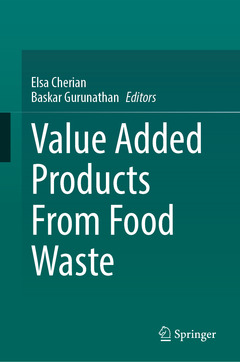Value Added Products From Food Waste, 1st ed. 2024
Coordonnateurs : Cherian Elsa, Gurunathan Baskar

The rapid increase in industrial processes for the preparation and processing of various food products have resulted in the creation of large quantities of waste. These food wastes contain large amounts of nutrients which can be further converted into useful products, making byproduct technology increasingly important.
Byproducts produced from various agro-based industries like cereals, fruits, vegetable processing, fish, meat and poultry can be converted into beneficial products. For instance, cereal and legume processing produces large quantities of wastes which can result in environmental problems affecting air, soil and water quality. These wastes can be efficiently utilized and converted into value added products such as bioethanol, butanol, biohydrogen, biogas, biocoal, industrially treasured enzymes, biofertilizer, proteins and organic acids.
Value Added Products From Food Wastecovers waste managementtechniques utilized for managing raw materials in the food industry in an efficient way, recovering and reusing waste or neutralizing unwanted components. Chapters focus on the latest technologies and efficient management systems in all areas of food processing that make this process economical and minimize the hazards caused by the deposition of waste. From the dairy industry to cereals to fruits and vegetables to fish, each aspect of the food industry is examined with an eye for how to utilize food waste, transforming these wastes into value added products.
Introduction
Food waste to food and nutrition security-need of the hour
Utilization of food waste
Waste utilization from Dairy Industry
Value Addition and Sustainable Management of Dairy industry by-products
Waste utilization from cereals
Cereal: an emerging supplement to reduce malnutrition and hunger
Byproduct Utilization from cereal waste
Effective Utilization of Agro Based Cereals to Value Added Products: A Global Perspective
Waste Utilization from Fruits and Vegetables
Utilization of waste from Fruits processing industry
Eco Enzyme Production and Characterization from Fruit Wastes using microorganism
Valorization of Fruit Processing Industry Wastes into Value Added Chemicals
Microbial processing of fruit wastes for the creation of potent enzymes, as well as the scope of biotechnology
Emerging trends and future perspectives of value-added products from vegetable waste
Commercial Products Derived from Vegetable Processing Industrial Wastes and their Recent Conversion Studies
Exotic nutrients from tamarind (Tamarindus indica) seed - a sustainable healthy food choice
Valorisation of Wastes and By-Products of Cane-Based Sugar Industry
Fruits and vegetable waste as a valuable source for production of antibiotics and biofuels
Waste utilization from meat, poultry and fish
Exploitation of waste from Meat and Poultry Industry
Keratinase Enzyme Synthesis and Characterization from Poultry (Chicken Feather) Processing Refuse: A Waste to Wealth Approach
By-product utilization of marine sources
Waste to wise products from the fish processing industry
Valorization of Aquatic Wastes as Source of Food Additives
Conversion of food waste into biofuel and electricity
Conversion of Food Waste to Valuable Biofuels: Modern Tendency, Process Enhancement and Scientific Challenges
Utilization Food Industry Wastes into Renewable Energy Production Practices: Current Trends and Future Prospects
Valorization of Agro Waste Biomass into Biofuel: A Step towards Effective Agro Waste Management
Food Process Industry waste biomass as a promising alternative for green electricity production
Dr. Elsa Cherian is a distinguished academician and researcher who presently holds the position of Associate Professor and Head of the Food Technology Department at Saintgits College of Engineering, located in Kottayam, Kerala, India. With 15 years of dedicated service in the field of education and research, she has established herself as a prominent figure in the domain of food technology. In addition to her teaching responsibilities, Dr. Elsa Cherian is a prolific researcher. She has authored a substantial number of research papers and book chapters that have added to the body of knowledge in food technology. Her contributions to scholarly literature have helped in disseminating the latest advancements, techniques, and findings in the field. These publications serve as valuable resources for students, researchers, and professionals in the food technology sector.
Dr. Baskar Gurunathan is currently a Professor in the Department of Biotechnology at St. Joseph’s College of Engineering in Chennai, Tamil Nadu, India. He has 22 years of rich teaching and research experience in different fields of Biotechnology. He has published 190 research and review articles in reputed National and International Journals, 37 book chapters and edited 6 books. Visited Swiss Federal Institute of Technology (EFPL), Switzerland as visiting researcher in November and December, 2018. Major research areas include biofuels, bioenergy, technoeconomic analysis, environmental impact analysis, nanocatalysis, nanomedicine and Food safety. He is the Fellow of the Institution of Engineers (India) and International Society for Energy Environment and Sustainability. Active life member of various national and international professional bodies. Listed in top 2% Scientist in the world consecutively in 2020 and 2021 by Elsevier BV and Stanford University, USA. Bestowed ISTE-Periyar Best Engineering College Teacher award 2020 from Indian Society for Technical Education-Tamilnadu Section,
Covers waste management techniques utilized for managing raw materials in the food industry in an efficient way
Focuses on the latest waste management technologies and efficient management systems in all areas of food processing
Examines new technologies and processing systems to utilize food wastes
Date de parution : 05-2024
Ouvrage de 340 p.
15.5x23.5 cm



